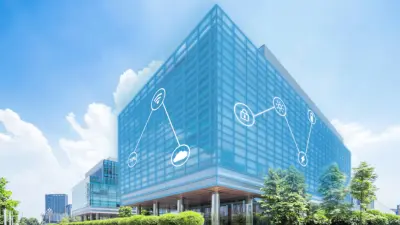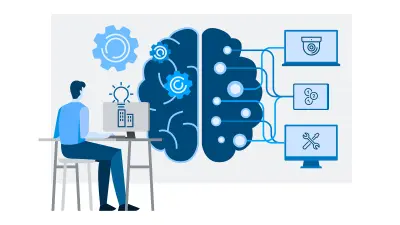How intelligent solutions support facility management
Optimal support: learn about important new trends in modern facility management with intelligent solutions and new services for building systems
The requirements that managers of commercial buildings and other properties must meet have changed rapidly in recent years. While continuing to perform the tasks traditionally associated with building and plant management, facility managers are now facing new challenges.
Buildings are increasingly expected to be sustainable, safe, and comfortable while focusing to a greater extent on meeting the needs of their users. A wider range of tasks needs to be performed to accomplish this, thus making facility management more complex. When it’s about operating commercial properties while meeting all of these requirements, networked building solutions come into play. This is because security, building automation, and power supply systems generate large volumes of important data every single day. If this information is intelligently used and combined, completely new possibilities arise for comprehensively supporting facility management. And the best news is that systems for doing this already exist today.


What is meant by modern facility management?
In recent years, state-of-the-art facility management (FM) has evolved far beyond the activities traditionally involved in managing and maintaining buildings. Nowadays, those in charge devote themselves to comprehensively optimizing buildings and infrastructure. It’s about making sure that they perform their intended purposes while ensuring functionality, safety and security, and sustainability, improving their surroundings, boosting productivity, and reducing operating costs.
Modern facility management involves a wide spectrum of planning, commercial, infrastructural, and technical tasks. All of them contribute to ensuring that properties are operated as well as possible, that companies can focus on their core business, and that users can take advantage of optimized environments. This includes aspects such as planning and managing residential properties and investment projects and maintaining and operating facilities. Other things that are now integrated in the range of provided services include energy management, occupancy and space management, and optimizing the experience of employees and users. Facility management is also about dealing with emergency situations, preventing interruptions to business activities, and adding value for operationally and strategically managing companies.
Savings of 30%
can also be achieved in legacy buildings if they are intelligently operated with integrated systems.
How can building technology support modern facility management?
Facility managers perform a wide range of important tasks, day in and day out. Some of these can be planned in advance, while the need for others arises erratically. The fact that many services can already be effectively designed and steadily improved today is mainly attributable to one crucial shift: in recent years, building technology has evolved from a hardware-oriented world to one that is networked and sensor-based. The difference is dramatic. Thanks to IoT and connectivity, major parts of a building’s technical systems can now be tightly interlinked. As a result, technologies, equipment, and building systems controlled by software and equipped with sensors are able to capture data from a building and intelligently use it. Whereas in the past each of a building’s specialized functions operated in isolation, now a holistic approach is possible in which they join forces and work as a team within the scope of a integrated overall system. Thanks to the use of intelligent, networked solutions for building security, building automation, and energy efficiency, facility managers are enabled to ensure safe, secure, and efficient buildings that have low emissions and offer end users greater comfort and wellbeing. At the same time, less work is required to manually perform relevant tasks, thus reducing the workload of the facility management team.
Can facility management tasks be performed more easily with networked building systems?
Modern building technology provides a wide array of possibilities for making facility management easier, more efficient, more extensively digitalized, and more state-of-the-art while reducing operating costs at the same time – and doing it today. The benefits start with the time that is saved because it’s no longer necessary to inspect the entire building on foot, continue across intelligent tools that deliver meaningful information on building use, and extend all the way to digital documentation for supporting the everyday work of those involved. The bottom line is that a multitude of individual tasks is facilitated.
The ability to integrate IoT-capable building technologies and systems of different makes in a single management system enables efficient operation and better monitoring.
Modern building management solutions include central dashboards that provide an overview of the building’s momentary condition and make everything easy to control.
IoT and connectivity make it possible to capture and analyze data from building systems. Intelligent evaluation of captured data on everything from overall operation of a building all the way to how individual parts of it are used opens the door for detecting patterns, optimizing processes, increasing efficiency, and reducing costs.
Sensors automatically capture and evaluate data on technical components. Wear or malfunctions are detected before they can become critical, failures are prevented, maintenance costs are reduced, and planning is facilitated.
Building automation can efficiently monitor and control heating, ventilation, and air conditioning (HVAC) and even lighting all the way down to the level of individual rooms. This can yield substantial energy savings while reducing manual processes at the same time.
Networked building security solutions based on state-of-the-art technologies provide diverse possibilities for preventing and responding to challenges. The use of artificial intelligence in video equipment makes it possible to detect irregularities, tell objects and persons apart, and make predictions.
The energy consumed by processes, units, systems, devices, and meters can be automatically captured and viewed. This reveals the energy consumption of floors, buildings, and locations, which can be compared to one another and optimized.
Intelligent systems automatically adjust environmental parameters such as temperature, illumination, and air quality to users’ needs, thus increasing their satisfaction and productivity.
Thanks to digitalization, facility management can provide new, user-oriented services. These range from flexibly adjusted room temperatures across booking of workplaces, meeting rooms, or parking spaces, all the way to mobile access solutions.
We’ll be happy to advise you!
Our experts make it possible: by working with you to create commercial buildings that are safe, comfortable, efficient, and sustainable – and equipped to meet both today’s and tomorrow’s challenges. Let’s talk about how we can support you.








